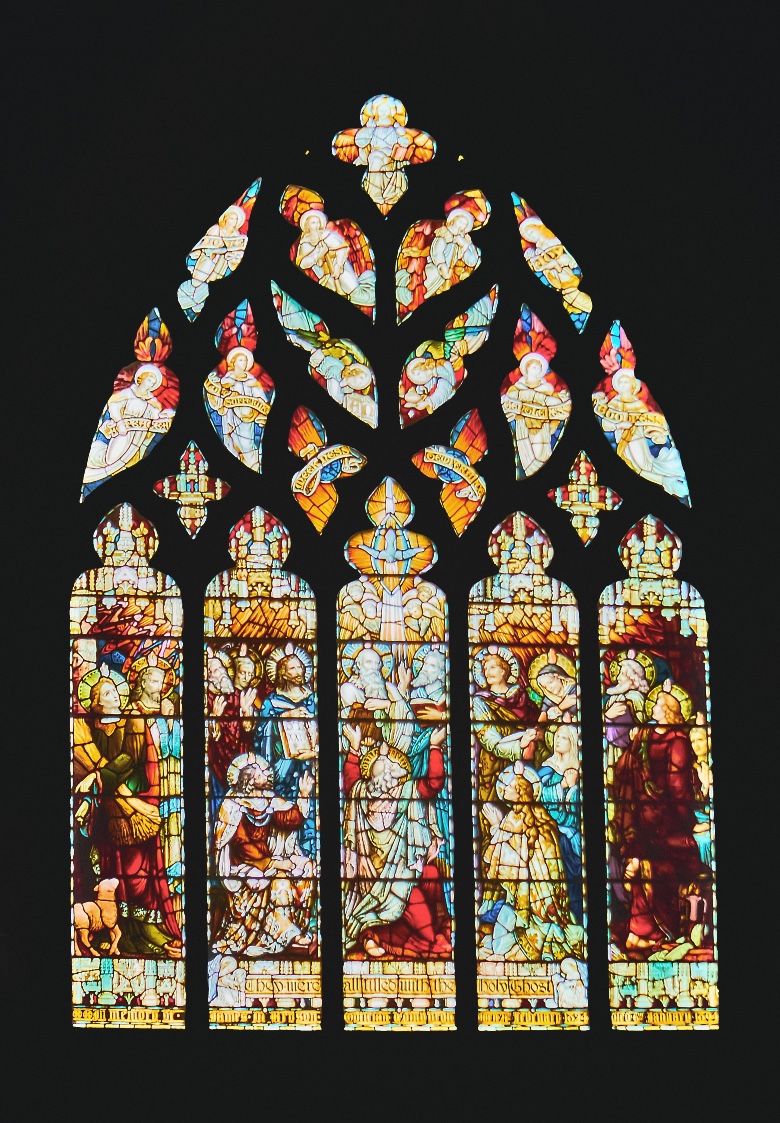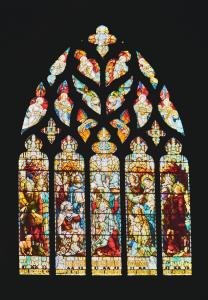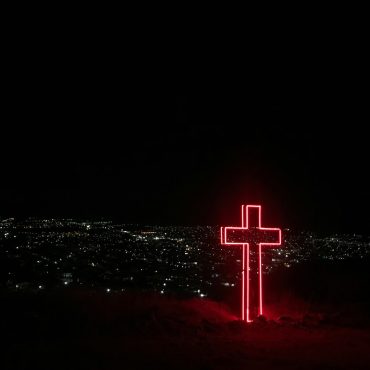-
 play_arrow
play_arrow
OchriO Streaming Live 24/7/365
-
 play_arrow
play_arrow
OchriO Live Stream
-
 play_arrow
play_arrow
London Calling Podcast Yana Bolder



“What Happens at Pentecost?”
Pentecost is an important holiday on the Christian calendar. It celebrates the fulfillment of Jesus’ promise of the Holy Spirit to his disciples. However, it is also relatively unknown outside the Church, and often neglected within the Church. So why is Pentecost important? To answer that question, I’ll first discuss what happened at Pentecost. Then, I’ll look at what happens at Pentecost – why is it still important to the Church?
Acts 2:1-12 (NIV):
When the day of Pentecost came, they were all together in one place. Suddenly a sound like the blowing of a violent wind came from heaven and filled the whole house where they were sitting. They saw what seemed to be tongues of fire that separated and came to rest on each of them. All of them were filled with the Holy Spirit and began to speak in other tongues as the Spirit enabled them.
Now there were staying in Jerusalem God-fearing Jews from every nation under heaven. When they heard this sound, a crowd came together in bewilderment, because each one heard their own language being spoken. Utterly amazed, they asked: “Aren’t all these who are speaking Galileans? Then how is it that each of us hears them in our native language? Parthians, Medes and Elamites; residents of Mesopotamia, Judea and Cappadocia, Pontus and Asia, Phrygia and Pamphylia, Egypt and the parts of Libya near Cyrene; visitors from Rome (both Jews and converts to Judaism); Cretans and Arabs – we hear them declaring the wonders of God in our own tongues!” Amazed and perplexed, they asked one another, “What does this mean?”
Some, however, made fun of them and said, “They have had too much wine.”
What happened at Pentecost?
In John 14-16, Jesus discussed the coming of the Holy Spirit with his closest followers – the eleven apostles. (Judas Iscariot had already departed.) Jesus directed his comments about the Holy Spirit to those eleven, but his they apply to all of us. Jesus’ teaching about the Holy Spirit is the subject of my second article dealing with Pentecost, “How Does the Holy Spirit Help the Disciples?” For now, I want to focus our attention on what happened “at Pentecost” as related in Acts 2:1-12.
Empowering Disciples for Ministry
We need to remember first that the believers who were all together in one place (v 1) included more than the apostles. Acts 1:15 tells us that the group of believers included about 120 people. Additionally, Acts 1:14 indicates that this group included both men and women. Accordingly, it is reasonable to assume that the “all” who were together on the day of Pentecost included this group of 120.
Acts 2:14 says that Peter “stood up with the Eleven, raised his voice and addressed the crowd.” This further suggests that more than the Eleven were present. All of these disciples were gathered for prayer “constantly” (1:14). The implication is that all 120 were present and praying, and they were all filled with the Holy Spirit. They all began to speak in other tongues as the Spirit enabled them.
This empowerment – to speak in other languages – clearly had a ministry focus, because the crowd who gathered heard them “in our own native language” (v 8). The message that the disciples proclaimed was the wonders of God (v 11). This preceded the Peter’s preaching, which begins in verse 14. Jesus had promised that his followers would receive power when the Holy Spirit came upon them, and that is just what happened.
Encouraging Disciples for Ministry
The “day of Pentecost” was connected with the Jewish celebration of the Festival of Weeks, which took place fifty days after the Passover. Today, we observe Pentecost on the Sunday which is the fiftieth day after Easter Sunday (seven weeks, including both the beginning and ending Sundays). The crowd that we find in Jerusalem on the day of Pentecost in Acts 2 were there for the celebration of the Festival of Weeks. Many of them may have remained in Jerusalem from Passover through Pentecost.
As noted above, that was the likely explanation for the empowerment of the disciples to speak in other languages. But that was not the only help the believers needed! They were in Jerusalem, the city where Jesus had been crucified. It had been less than two months since Jesus’ arrest and execution. The Romans still ruled. The Jewish religious leaders still held power over much of Jewish life. And the disciples were the same people who had met “with the doors locked for fear of the Jewish leaders” (John 20:19, 26).
Yet after the Holy Spirit came upon them on the day of Pentecost, Peter and the other apostles stood up before the crowd and began to proclaim the truth about Jesus. And this truth wasn’t just some warm, fuzzy message! “This man was handed over to you…and you, with the help of wicked men, put him to death by nailing him to the cross” (Acts 2:23). They were no longer cowering in fear; they confronted the gathered crowd with the truth. Thanks to the Spirit, they were no longer afraid!
Equipping Disciples for Ministry
As the members of the Sanhedrin would later note, the apostles were not trained in the rabbinical schools. They were amazed at both their courage and their understanding: “When they saw the courage of Peter and John and realized that they were unschooled, ordinary men, they were astonished and took note that these men had been with Jesus” (Acts 4:13). But they had been with Jesus before Pentecost, and they weren’t standing up and proclaiming Jesus then!
Jesus had promised them that the Holy Spirit would “teach you all things and remind you of everything I have said to you” (John 14:26). The Holy Spirit not only empowered and encouraged them; he also equipped them by teaching them the truth. As the gospel spread throughout Jerusalem in those first months after the Pentecost event, the apostles continued to learn from the Holy Spirit. This enabled them to evangelize unbelievers and to lead the growing church in its mission.
What Happens at Pentecost?
That brings us to today. What happens at Pentecost? Why is it still important?
Empowering for Ministry
Just as the Spirit empowered the first disciples for ministry, so he still empowers believers today. As Paul says in 1 Corinthians 12:4, “There are different kinds of gifts, but the same Spirit distributes them.” After discussing some of those gifts, he says in verse 11, “All these are the work of one and the same Spirit, and he distributes them to each one, just as he determines.”
First, notice that the Spirit distributes them “to each one” – in other words, to every believer. Next, Paul goes on later in chapter 12 to compare the Church to a body, where each part works together for the benefit of all. And the purpose of those gifts is to build up the body and enable it to do the work that Christ has set before it: to go make disciples (Matthew 28:19-20). Just as Jesus promised power to the first disciples when the Spirit came upon them, so today the Spirit empowers believers to continue the work of the Kingdom.
Encouragement for Ministry
“When you are brought before synagogues, rulers and authorities, do not worry about how you will defend yourselves or what you will say, for the Holy Spirit will teach you at that time what you should say” (Luke 12:11-12). The Holy Spirit does not just teach us; he also encourages and comforts us.
In John 14, Jesus says that the Spirit will be “another advocate” to be with his followers (John 14:16). The word translated “advocate” is parakletos. Most Bible scholars recognize that this word is difficult to translate with any one English word, and so they often simply transliterate it and render it “Paraclete.” However, one common translation in the past was “comforter.” In fact, there is a classic hymn entitled “The Comforter Has Come” which is a common song for Pentecost. To paraphrase what Jesus said, we don’t have to worry or be afraid, because the Spirit is with us.
Equipping for Christlikeness
Jesus calls all would-be disciples to “follow me.” That’s what he said to the first disciples he called. He also said that anyone who would follow him must deny themselves, take up their cross daily, and follow him (Luke 9:23). The call to follow is not just to “learn,” but to be formed in the image of Jesus. He teaches us by his example.
In the NIV translation of Galatians, the last part of chapter 5 is entitled “Life by the Spirit.” In that passage, Paul contrasts “the acts of the sinful nature” with “the fruit of the Spirit.” He then lists the fruit of the Spirit: love, joy, peace, patience, kindness, goodness, faithfulness, gentleness, and self-control. Anyone with an ounce of honesty would admit it: that fruit doesn’t grow on just any old tree!
But that fruit is exactly what demonstrates that we are becoming like Jesus, because his life demonstrated all of it. “The flesh (sinful human nature) desires what is contrary to the Spirit, and the Spirit what is contrary to the flesh” (Galatians 5:17). Jesus did not sin, so none of those acts of the flesh were present in his life. If we are to be like him, we need to put away the acts of the flesh and allow the Spirit to cultivate his fruit in us.
Conclusion
What “happens” at Pentecost is exactly what “happened” at Pentecost: the Holy Spirit empowers believers for ministry, encourages them, and equips them to become like Jesus. My next article will discuss in more detail how the Holy Spirit helps us, by considering what Jesus promised his disciples about the Spirit. But what happens at Pentecost is absolutely vital for our spiritual health and growth!
Written by: OchriO
Similar posts
Recent Comments
No comments to show.Featured post

Latest posts
Current show
Upcoming shows

Impulse Amandla!!!
Presented by Dj Ross
09:00 - 12:00
Effulgent Amandla!!!
Presented by Dj Ross
12:00 - 15:00
Unretouched Amandla!!!
Presented by Dj Ross
15:00 - 18:00
Stratagem Amandla!!!
Presented by Dj Ross
18:00 - 21:00
Kindle Amandla!!!
Presented by Dj Ross
21:00 - 00:00Chart












Post comments (0)